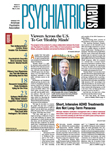Some of the evidence that this is the case comes from a survey that APA conducted of its members in April about the impact of the current economic crisis on their patients, themselves, and their practices. Eight hundred-and-five members responded.
Said one: “I thought as a doctor I'd never have to worry about money. Wrong! Half of my retirement funds are gone. I have worked very intensely my whole career and was looking forward to a great retirement fairly soon.”
Said a second: “I am losing money on seeing patients in the office. If it were not for a clinical trials practice and some speaking engagements, I would have gone bankrupt a while ago.... In addition, I have given up the thought of retirement.”
A third reported: “My patients are more stressed, sicker, and crankier. That increases my stress and also my receptionists' stress.”
And a fourth noted: “I am still extremely busy—working harder for less income. Yet I feel lucky to be working nonetheless. If this continues, however, there will be a point of diminishing returns in which my practice will fail.”
Interviews that Psychiatric News conducted with members likewise illustrate how the economic crisis is impacting some of them.
“I see so many students ... working long hours as well as carrying heavy academic loads,” Leigh White, M.D., who works in a student psychiatry service at Michigan State University, told Psychiatric News. She finds their struggle disheartening, she said. Sometimes she is tempted to tell them, “Don't work so hard,” but then she recalls,“ They need their job to afford college, to afford medication, and to see me. It is sort of a Catch-22 situation.”
“As an individual I am not, of course, any more immune to the recent economic forces than my patients are,” Charles Berlin, M.D., a Pittsburgh psychiatrist in private practice, said during an interview.“ I worry about my declining investments as I approach retirement as much as my patients worry about their own finances. That's given rise for me to need to pay particular attention to my own countertransference feelings when this topic comes up in the office.”
“We have had a number of psychiatrists [leave the state], so it has significantly elevated my workload,” Michael Engel, D.O., a psychiatrist in private practice in Traverse City, Mich., lamented. Also, “when patients fear that they are going to experience foreclosure or bankruptcy, that makes my life as a psychiatrist more stressful because I have more things to do to help them manage.”
“I have been working half time for the state of California and have been furloughed for 10 percent of it,” Robert Burchuk, M.D., of Woodland Hills, Calif., reported. Burchuk is also president-elect of the Southern California Psychiatric Society.
“We are on an inner-city urban campus, so we see a fair number of patients who don't have insurance or who have Medicaid,” Daniel Dahl, M.D., an associate professor of psychiatry and psychiatry residency training director at the University of Alabama, said. “What would impact us would be substantial cuts in Medicaid. They would drastically affect the financial resources of our department. We hope we don't see those cuts, but there is that potential.”
“Our state legislature has just made massive cuts in mental health funding,” Howard Weeks, M.D., medical director of youth services at the University of Utah Neuropsychiatric Institute, commented. “That is going to have a very severe impact over the next year or two ... for our outpatient services ... as well as for reimbursement for providers.” ▪
